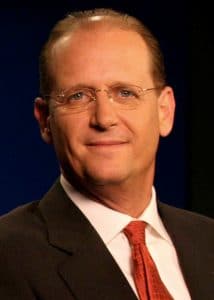A U.S. senator from Kansas received an assurance in a letter from Amtrak’s president and CEO that the national passenger carrier will maintain long-distance service at its current status quo through the 2019 fiscal year, which ends Sept. 30, and possibly on through the enactment period of the Fixing America’s Surface Transportation (FAST) Act, which runs through the 2020 fiscal year.
However, U.S. Sen. Jerry Moran’s delay on the consideration by the U.S. Senate of three presidential nominees to the Amtrak Board of Directors, which he started in early May, appears that it will continue.
Kansas News Service (ksnewsservice.org) reported that a spokesperson for the senator said a May 22 in-person meeting between Moran and Anderson was a “step in the right direction.” However, the holds Moran placed on President Donald Trump’s nominations to the Amtrak Board of Directors will remain while he awaits more answers to questions that arose from that meeting, the report said.
Moran is particularly concerned about the long-term future of the daily Chicago-to-Los Angeles Southwest Chief route. Last year, U.S. senators had to pressure the carrier to continue the route, which serves many rural areas, through the 2019 fiscal year.
Amtrak’s top boss, Richard Anderson, wrote in a letter to Moran that congressional action has secured the short-term future of the long-distance routes.
“We believe that Congress generally endorsed continued operation of our current route network for the five-year period from FY15-FY20 through the enactment of the Fixing America’s Surface Transportation (FAST) Act,” Anderson wrote. “Thus, although Amtrak is not technically required to operate any given route under the FAST Act, we plan on operating all of our long-distance trains for the remainder of this period while seeking to drive improved performance consistent with our goal to grow ridership while reducing Federal subsidies.”
However, Anderson also indicated that alterations to the long-distance interstate service again will be considered as the carrier seeks to build upon its recent performance, with increased ridership and record-setting fiscal performance with higher revenue and reduced operating losses.
“… We must position ourselves to attract a new generation of customers. Just as other modes of transportation and businesses are compelled to evolve, so must we if our mode is to grow as a relevant and efficient means of mass transportation,” Anderson wrote. “We owe this to our customers and your constituents, along with our nearly 20,000 hard-working and dedicated employees. That is why we have a plan to break even on operating results by 2020.”
Anderson went into detail about the financial performance and cost of the carrier’s long-distance routes and said more than half of the federal appropriations that Amtrak received went toward funding those routes.
“Long-distance trains require large federal subsidies because their revenues are lower and operating costs are higher than Amtrak’s state-supported and NEC (Northeast Corridor) services. The federal government is virtually the only funding source for the capital investments they require,” Anderson wrote. “These costs are set to increase significantly in the future as we face host railroad-related poor on-time performance across the network and much of our equipment used in long distance service reaches the end of its useful life and requires replacement.”
Discussion of an upcoming funding reauthorization in Congress will give a clearer indication of the future of the long-distance routes, Anderson said.
“Looking forward, we aim to have a conversation with Congress and our other stakeholders about the future of the long-distance services,” Anderson wrote. “While we strongly believe that there is a permanent place for high quality long-distance trains in our network, the time to closely examine the size and nature of that role is upon us for numerous reasons.”
The replacement of long-distance routes with new corridor service is certainly on the table for Amtrak, Anderson said. Among potential corridors warranting further study are Mobile, Alabama to New Orleans; Fort Worth, Texas to Newton, Kansas; Minneapolis and St. Paul, Minnesota to Chicago and Duluth, and the Front Range Corridor.
An initial analysis of these potential corridor routes is expected to be performed this summer, he wrote.
“Demand for shorter rail trips in corridors between major cities is increasing, particularly in the fast-growing South, Southwest and Mountain states,” Anderson wrote. “However, the minimal service Amtrak currently provides in these regions, with long-distance trains that are often many hours late and serve major cities in the middle of the night, does not meet the needs of their rapidly increasing populations.”
Follow this link to read Anderson’s full letter to the senator.
The three nominees whose nominations have been placed on hold by Moran are Rick Dearborn, Joseph Gruters and former U.S. Rep. Lynn Westmoreland. SMART TD opposes Westmoreland’s nomination.
Tag: Sen. Jerry Moran
U.S. Sen. Jerry Moran (R) of Kansas is putting a delay on the consideration by the U.S. Senate of three nominees to the Amtrak Board of Directors and wants a solid commitment from the carrier that the long-distance Southwest Chief route will be preserved.
Amtrak President and CEO Richard Anderson has arranged a meeting later in May with Moran and other senators who represent states that host the daily Chicago-to-Los Angeles route to discuss the Southwest Chief’s future, according to a report published by the Topeka Capital-Journal.
The three Amtrak board nominees are Rick Dearborn, Joseph Gruters and former U.S. Rep. Lynn Westmoreland. SMART TD opposes Westmoreland’s nomination.
The future of the Southwest Chief has been uncertain with Amtrak leadership first targeting it because of Positive Train Control concerns and a proposed “bus bridge” being looked at as an option to avoid placing the technology on some trackage. Last year, U.S. senators had to pressure the carrier to continue the route, which serves many rural areas, through the 2019 fiscal year.
Read the full story on the Topeka Capital-Journal website.

This amendment would provide resources for maintenance and safety improvements along the Southwest Chief route and would compel Amtrak to fulfill its promise of matching funding for the successful TIGER IX discretionary grant supported by the Kansas Department of Transportation and local communities along the route. In addition, this amendment would effectively reverse Amtrak’s decision to substitute rail service with bus service over large segments of the route through FY2019.
“As the divide between urban and rural communities in America continues to expand, passenger rail services like the Southwest Chief are invaluable in connecting Kansans to the rest of the country while also bringing visitors from out of state to our local communities,” said Sen. Moran. “I applaud the bipartisan efforts to keep the Southwest Chief operational for our rural communities and will continue working with Amtrak to make certain this route remains available for the Kansans who need it.”
“For the second time in two weeks, the Senate is speaking out with strong, bipartisan support for long-distance rail, especially the Southwest Chief — and this time with $50 million in new funding,” said Sen. Udall. “Replacing rail service with bus service between Dodge City, Kansas and Albuquerque, New Mexico would not only have completely disrupted service for Amtrak passengers, it would have discouraged riders from taking the Southwest Chief in the first place, adding to Amtrak’s financial problems. The Southwest Chief route is an economic engine in New Mexico, giving passengers a ride through time — through the historic West — and connecting our communities. The additional funding from our amendment will make sure the Southwest Chief gets back on a sound financial track. I remain committed to working with our communities, Amtrak leadership, and other stakeholders to keep the Chief running long into the future.”
“I am pleased the Senate has approved our amendment to ensure continuous rail service on all long distance routes, especially the Southwest Chief,” said Sen. Roberts. “We heard from many Kansans strongly opposed to the proposed bus service within the route.”
“I’m excited to support an amendment that will greatly help the Southwest Chief’s continued presence in southeastern Colorado,” said Sen. Gardner. “The amendment secured by the bipartisan coalition in the appropriations bill will set aside funding for route improvements and enhancements, providing the opportunity to ensure the Southwest Chief stays in Colorado and continues servicing the rural areas that desperately need it.”
“The Southwest Chief is an important component of Southeastern Colorado’s tourism economy, and we will do all we can to preserve it,” said Sen. Bennet. “We’ll continue to work closely with lawmakers from Colorado—and also New Mexico and Kansas—to keep running the Southwest Chief through our state.”
“I’m proud to help lead this bipartisan coalition in the Senate to save the Southwest Chief, and I hope that my colleagues in the House of Representatives agree that fighting for infrastructure in rural America is good for our economy as a whole,” said Sen. Heinrich. “Each year, the Southwest Chief brings thousands of Boy Scouts from around the country to New Mexico’s Philmont Boy Scout Ranch and generates economic activity in our communities like Raton, Las Vegas, and Lamy. It makes no sense for Amtrak to provide inferior service while cutting out a key part of rural America. We’re going to continue fighting any effort to undermine this important route.”
The Southwest Chief runs daily between Chicago and Los Angeles and connects towns and cities in Kansas, Illinois, Missouri, Iowa, Colorado, New Mexico, Arizona and California and provides passenger train and long-distance passenger service, particularly through rural communities. The Southwest Chief stops in several Kansas communities including Lawrence, Topeka, Newton, Hutchinson, Dodge City and Garden City.
Items to Note:
- Last week, the Senate overwhelmingly passed a Sense of the Congress measure to affirm support for the long-distance rail service.
- Last month, the senators sent a letter to Amtrak’s CEO urging him to uphold Amtrak’s side of a longstanding public-private partnership to continue operating the Southwest Chief passenger train and long-distance passenger service.
- In May, the senators sent a bipartisan, multi-state letter condemning Amtrak’s decision not to match TIGER grant funds.
The above press release was released by Sen. Jerry Moran (R – Kan.) on Aug. 1, 2018, and originally appeared here.
